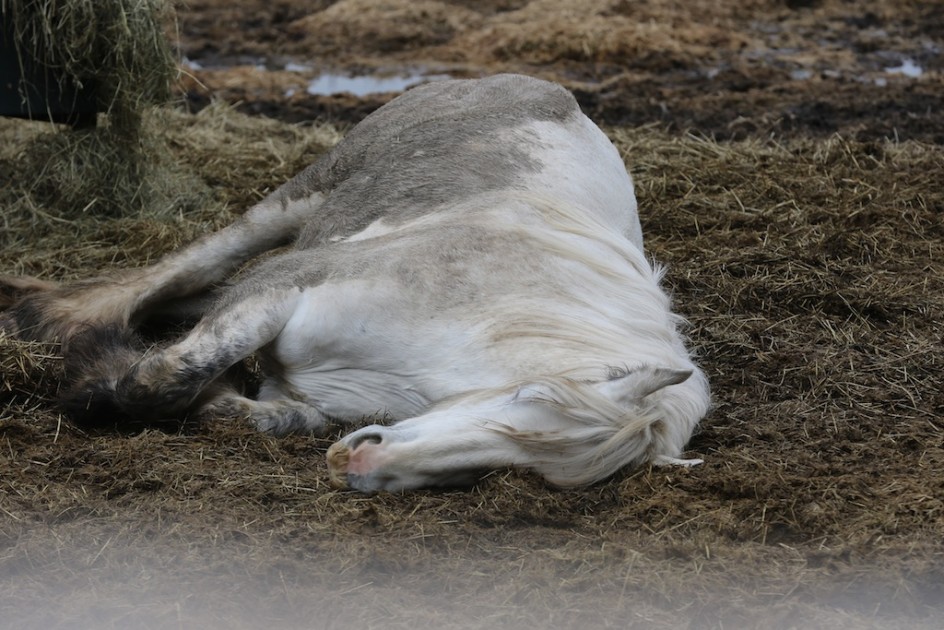
What do you see when you look at this picture? I’ll tell you the truth.
If you see an abused animal, or a horse you think must be dying, starving, or abused, then you have become disconnected with the natural world and the real lives of animals. This horse, who I saw recently by his hay feeder, has just eaten and is taking a nap in his favorite spot, right in the mud and moisture. His own version of a warm bath. And it wasn’t warm.
Anyone who has horses or donkeys or farm animals and who lives on a road – anyone- will tell you how many times people have pulled over, rushed to the fence, come into the barns, often angrily and accusingly – and rudely – to demand that someone help the horse or donkey or cow or goat or sheep. They must be abused.
Manipulative – and often lucrative – images and videos on social media and the media-supported hysteria over animal abuse have turned many Americans into secret informers, patrolling farms and yards and private phones, eager to turn in strangers or neighbors, invade privacy and threaten a way of life. There is not a real farmer in America – or animal lovers with farms – who has not experienced this. Many live in fear of it, some have moved their pastures out of sight and away from the road.
The police often appear after the informers pass by, sometimes with animal control officers or humane society agents. Once in awhile they find animals in distress, sometimes they find things that have nothing to do with abuse, like frozen water tanks, or an empty feed can. Farmers and horse lovers beg me not to take photos of any animal who is lying down, informers are everywhere, they say.
it is now routine for people with animals to have police or animal control officers pull up to their farms to say that someone has reported an abused or neglected animal on their farm. Do you mind if we take a look? A generation ago, this would have been a rare, almost unheard of thing. People still lived with animals then, they knew something about them. And people, I am told, minded their own business and respected people’s privacy. As long as they were well treated, there was something private and personal about a human’s relationship with his or her animals.
The police in my town know that when Lulu rolls in the mud to clean off her coat and protect herself from flies, she is not dying or in great pain, she is not being abused. She is being a donkey. Sometimes, people driving by do not know this.
In our urbanized and over-developed world we have lost touch with nature, most of us no longer have animals in our every day lives. People driving around have been conditioned to look for abuse, the work of the new secret underground animal police. Facebook is the new bull hook. If you are looking for abuse, you are likely to convince yourself you are seeing it, with horses on farms, cows in the pasture, pigs in their huts, chickens in their roosts, elephants in the circus. Those farmers and workers and businesspeople and others who do live with animals increasingly feel like targets, under suspicion for simply having animals in their every day lives.
There are very few people in the world who would not care if their horse or donkey or goat or sheep is sick, or is dying or exhausted. Or would need to be told. Some animals are neglected, some are abused. Most are not. Farmers do not get animals to torture them or starve them to death.
“People used to come to the door to tell me if a cow got through the fence,” a farmer friend told me. “I appreciated it. Now they call the police if they see one standing out in the wind.”
Horse people do not look the other way when their animals fall ill or collapse – sudden death is a rare thing at any age. So the next time you see a horse lying down, it would be great if you did not rush into the barn and demand to know what the farmer or family is doing about it. It is a very hurtful thing to ask an animal lover why they are abusing an animal when their only crime is to have an animal who is acting like an animal. it is disturbing to have to convince police officers that there is no reason for them to be there.
As a person with a farm ( I am no farmer), I look the old idea about police and property. They stay away unless they have a very good reason to believe something is seriously wrong. That is why people fought the American Revolution, in great measure.
Animals lie down all the time, roll in the mud, sit out in the snow and rain, make strange noises, look filthy and raggedy.
Maybe next time when you take a drive in the country, look for something pretty and affirming – like animals living with people in the most sacred and ancient tradition, fortunate to be loved and cared for. Bring a carrot or ask if you can get close and learn something about what horses really need.
(You can help a blind horse live a life of peace and dignity in his new home. a gofundme project from Blue-Star Equiculture.)
